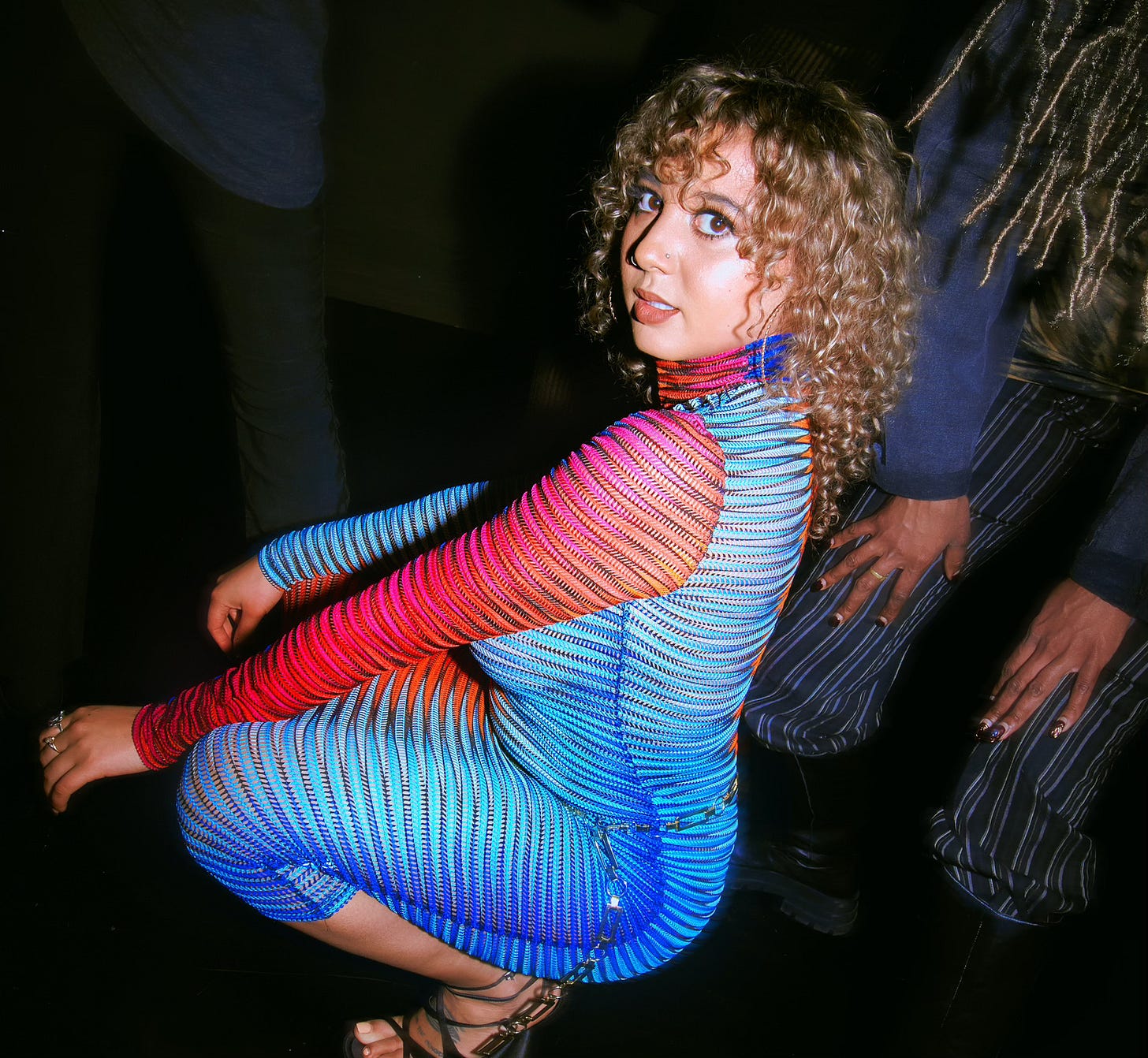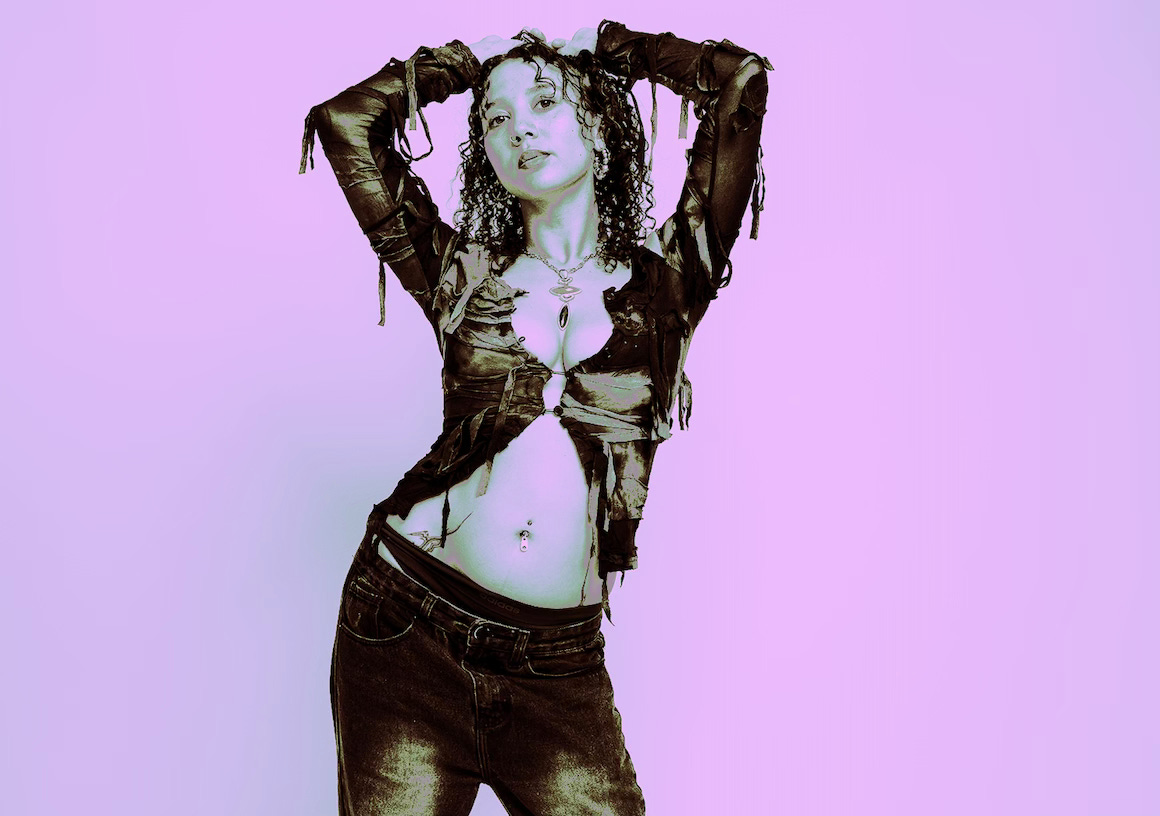#26 Deeper Into Outer Space | Honeydrip
Montreal's Honeydrip on building sound systems, her city's club scene and why bass is a powerful sonic force capable of bringing people together...
“Electronic music’s future is hybrid,” says Montreal DJ and producer Tiana McLaughlan who produces and performs as Honeydrip. “It’s about creating networks that don’t rely on extractive systems, but instead nourish the people in them.”
The future-forward bass-loving artist has multiple strings to her creative bow and walks it like she talks it when it comes to her own activities.
From playing dancehall and dub to heavy, percussive and chopped up sounds in her native city and beyond, Tiana has unveiled a ‘Psychotropical’ debut record and launched her own MORPH collective.
MORPH is a community endeavour aimed at bringing together LGBTQ+ and FLINTA participants with a love for speakers and hardware via ambitions to construct a sound system. MORPH’s aims are to help marginalised groups reclaim spaces that may not be as inclusive as they could be - so following a UK tour, we wanted to ask Tiana for her thoughts on the tensions, challenges and opportunities she’s pushing up against.
Our interview aims to go beyond the UK to uncover the obstacles percolating for electronic music culture further afield. Get to know more about Honeydrip, MORPH and Tiana’s bold plans to use sound system culture as a force for unity below…
To begin with, how did you fall in love with club music and sound system culture?
I started discovering electronic music in high school but preferred the more downtempo stuff. Even when I started DJing, I was first a lo-fi hip hop and chill electronic DJ opening for artists like MNDSGN. It wasn’t until I started going to raves and clubs around Montreal that I really opened up to dancefloor music. The energy of those spaces changed how I experienced sound, and over time, my musical tastes evolved.
Before all of that, my path into the music scene was through campus radio. It allowed me to connect with other fellow music nerds and propulse myself into Montreal DJ culture.
Sound system culture has always been close to me in a more personal way. I grew up listening to reggae, soca, and dancehall thanks to my mom. Even though it was my white mother introducing me to Caribbean music, it became a key way for me to connect with my Black identity. Although I have carried these sounds and influences with me my whole life, I had a deep reconnection with dub and reggae over the pandemic. It informed the sound I was producing and my ethos.
“When I began working on my debut album a few years later, I knew I wanted to create an immersive live experience. It was a conceptual project from the ground up and it led me to build my own subwoofers. By becoming a sound system owner, I was introduced to the local and global sound system culture.”
Were there key spaces where you cut your teeth as a dancer? I'd love to know more about your early adventures in clubs and your favourite spaces?
Montreal has always had a complicated relationship with afterhours and DIY spaces—there’s a constant struggle to keep them alive, yet I’m always amazed by how people continue to scout out and activate new spots. This creates a fast-paced turnover, and many of the places where I cut my teeth either no longer exist or have faded from memory. One of the most influential spots however was Durocher. It is a large building that contains loads of artist spaces and ambiguous lofts. The basement was the heart of the action, but on certain nights, DIY parties would be scattered across multiple floors, with more than one happening at the same time.
Like many underground spaces, it came with its share of sketchy ownership, an unfortunately familiar theme in nightlife, but those were some of my favorite environments for raves. On the club side, Datcha was my favorite. Especially their queer Thursday nights which were a guaranteed good vibe.
What led you into DJing and production?
Hosting a radio show was my first step into DJing. I needed continuous music to avoid dead air, so I taught myself how to mix. And, cliché as it may be, I was also dating a DJ at the time, who also introduced me to the world of DJing. Not long after I started, I realized that my favorite part of DJing was the blend - that magic moment when two tracks come together to create something entirely new. That curiosity naturally pushed me toward music production.
I ended up learning how to compose electronic music more formally through the electroacoustics program at university, which gave me both technical tools and creative direction. I then began releasing my own music in 2020.
Could you talk me through the process of constructing your sound system? Where did ideas for this initially come from? And how did you approach the project? What were the challenges with bringing this together?
I wanted to connect myself as much as possible to sound system culture as it had become a spiritual and identity thing for me. As I was preparing my debut live set, I decided I wanted to perform using my own sound system. I was drawn to the idea of shifting the focus away from the performer and onto the sound itself, and of playing from within the crowd rather than from a stage. It felt more communal, more honest.
At the time, I had almost no technical knowledge of how to take on a project like this. So I started asking around. I teamed up with cabinet maker Emilie Godin to build the wooden enclosures and found local builder Sako who mentored me through the electronics side.
“There are hardly any accessible resources on how to build speakers (unless you're into car audio) so most of the learning happens through scattered forum posts and niche conversations. It’s incredibly time-consuming and often frustrating.”
I ran into a lot of roadblocks: collaborators dropped out, budgets stretched thin, and every stage of the build came with uncertainty. You constantly find yourself asking, “Will this design choice affect the sound?” and often, there’s no clear answer. Many decisions are irreversible, which adds pressure. You have to be open to "failure" and accept that trial and error is part of the process.
I still haven’t built a full sound system yet. But I’ve realized something important: the music industry moves fast and pushes artists to constantly release, perform, and stay visible. My passion for sound systems doesn’t fit that pace and that’s how I like it. I want this practice to exist outside of those pressures.
How does a sound system dance bring people together in a way that perhaps club or festival experiences don't?
Sound systems are a force for community. The sound is composed of various interconnected components like speakers, amplifiers, mixers, etc. The system refers to the community that surrounds it; from the selectors to the engineers to the audience. Just as a sound system functions smoothly when all parts work together, a community thrives on the collaboration and integration of its members' diverse skills and roles.
In my opinion, it eliminates hierarchy and idolizing of the DJ, and brings music back to the centre of attention. The bass is also a force of unity and the way it hits our bodies is a shared experience.
How has the MORPH collective/community developed?
MORPH was born just this year. It actually came from a heartbreaking experience which was the first death of my subwoofers in a truck accident. Even though building them had been a community effort, I found myself alone when it came time to pick up the pieces. I had imagined a crew growing around them, a collective to run the system with me but that didn’t materialize. Still, I didn’t want to stay stuck in a victim mindset. Instead, I turned back to the community with a new proposal: to repair the subs together, not just as a fix, but as a learning opportunity. I began organizing workshops where people could get hands-on experience building and understanding speaker systems.
The MORPH collective is a blend of LGBTQ+ and FLINTA, strangers and friends, that share a curiosity and love for sound systems. We are still establishing ourselves and seeking funding but we have been repairing the subwoofers, working on a fundraiser, and hosted a speaker building workshop where we soldered passive crossovers, put together speakers from scratch. MORPH is as much about sound as it is about shared growth, empowerment, and rebuilding together.
There's plenty of press about the ongoing demise of clubs and the impact that festivals have had alongside Covid/cost of living crisis here in the UK - what's your take on this?
That’s a very loaded question. First and foremost, fuck capitalism. But seriously, the challenges facing music communities today are deeply layered. It’s not just one issue; it's an ecosystem of problems feeding into each other: exploitative ticketing and music industry structures, obsolete business models that don’t serve artists or allow nightlife spaces to survive, rising rents and gentrification pushing out cultural spaces, and the spread of silence culture in cities that once embraced noise and nightlife. DIY spaces, underground venues, and community-run initiatives are often the first to get pushed out or policed.
In the face of all this, I believe that investing in local community-building practices is more crucial than ever.
“Strengthening our local DIY scenes, sharing knowledge, supporting each other’s projects, and fostering sustainable, inclusive ecosystems are key to surviving the times ahead.”
I've spoken to different DJs, artists and promoters about regional sounds and scenes - do you think they persist?
I believe certain cities still have a sound, some more vague than others. However, I believe even just the ability to create new genres is very difficult so it is challenging for regional scenes to continue to differentiate themselves without continuing to create new sounds.
The future is hybrid and the internet has allowed people to take in global influences, for better or for worse. I personally appreciate new music that seems to take on multiple worldwide sonic influences.
I do think certain cities still have a sound. Some are more defined whereas others are more fluid or abstract. However, creating entirely new genres is increasingly rare, and without that kind of sonic innovation, it becomes harder for regional scenes to clearly differentiate themselves.
The future, in my opinion, is hybrid. The internet has collapsed borders in music culture, for better or worse, but is bringing about cross-pollination. While this can sometimes blur regional distinctions, I personally appreciate these new sounds that take on multiple sonic influences.
How does it work as a DJ when you're travelling to different dancefloors across the US and beyond? Do you tailor your sets to where you play?
I don’t really prepare my sets because I like to stay responsive to the moment and allow myself to become entranced. Though it happens rarely, the trance is so special when it does. I do take into account who else is on the lineup so I can complement the energy of the night while still carving out space to stand out. There was definitely a period where I got caught up in crowd-pleasing and tailoring, and honestly, I lost a bit of myself in that. These days, I focus on staying honest and consistent with my sound. It feels better creatively and seems to resonate more with audiences.
I'd love to know the producers/labels that are exciting you at the moment? Who are you buzzing off?
I am loving Amity, Scuffed, 7even, Ommaya and Eclipse Tribez right now.
What does the future for MORPH look like?
It is all still so fresh but our goal is to continue offering workshops to teach, uplift, and empower women and queer individuals in the technical and creative realms of sound system building. We also aim to explore creative approaches to speaker design and aesthetics. We applied for funding to be able to build our own sound system as well.
Connect with Tiana | Instagram | Bandcamp | SoundCloud
For more on club and rave culture, you can order a copy of my book, ‘Out of Space: How UK Cities Shaped Rave Culture’ via the Velocity Press website now.





